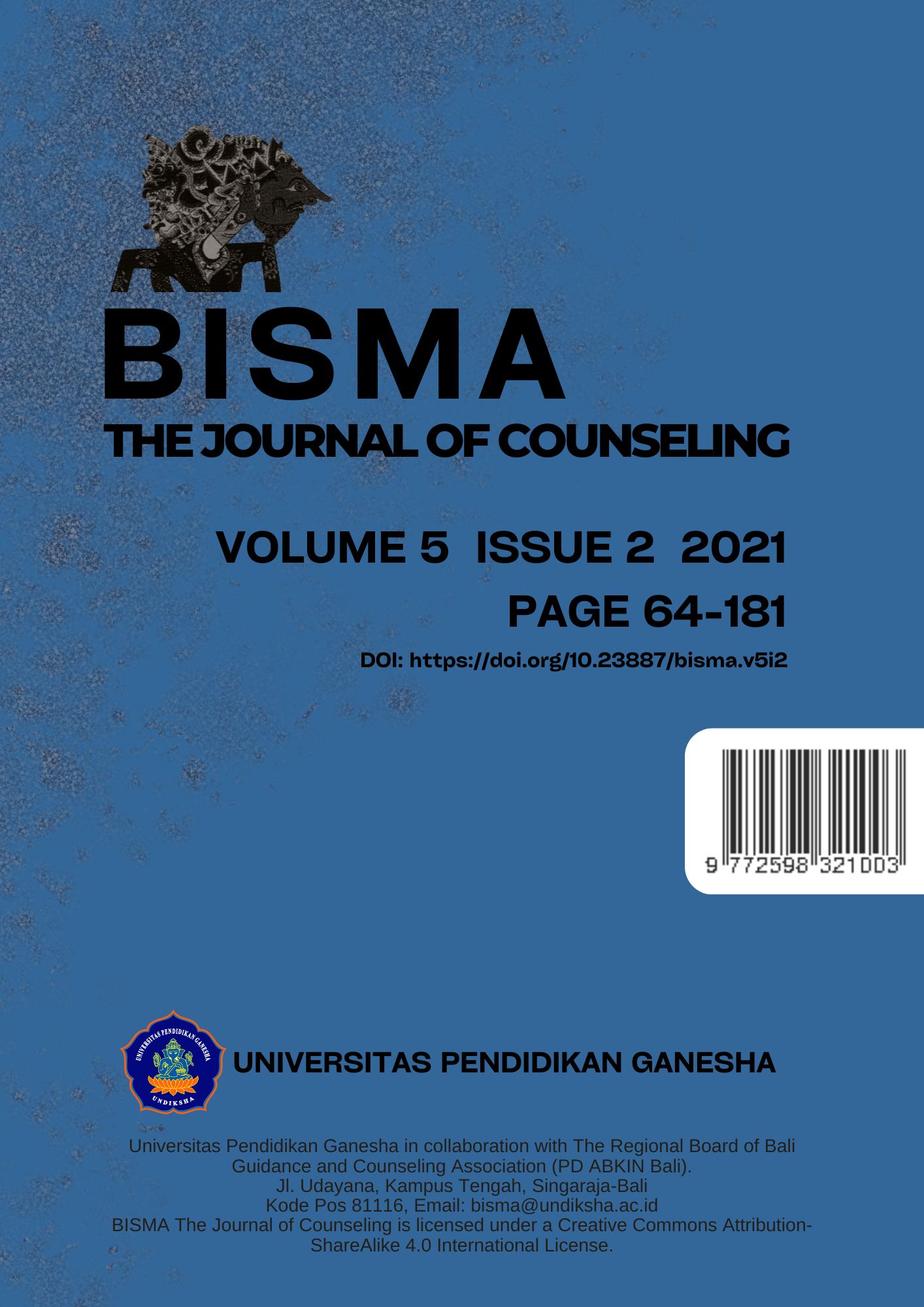The Correlation Between Students Achievement In Vocabulary And Speaking Ability at Grade 8 Junior High School Students
DOI:
https://doi.org/10.23887/bisma.v5i2.37789Keywords:
Students’ Achievement, Vocabulary, SpeakingAbstract
This research aimed to find out the correlation between students’ vocabulary mastery and speaking ability at grade 8 of SMP Negeri. This research was quantitative research which used correlational technique design. The sample of the research was 30 students of grade eight selected by clustering sampling. The instruments used in the research were vocabulary test and speaking test. Vocabulary test consisted of 50 questions of multiple choices, and speaking test in the form of role play. The research data were in the form of interpretation of students’ vocabulary and speaking test results, and their correlation. Based on data analysis, it was found that students’ vocabulary mastery and speaking ability were fair. They were proved by the mean score 65 for vocabulary mastery and 68 for speaking ability. Moreover, there was strong correlation between students’ vocabulary mastery and speaking ability. It was shown by the rvalue = 0,703 .
Keywords:Students’ Achievement, Vocabulary, Speaking
References
Afriani, I., Ratmanida, R., & Syafei, A. F. R. (2017). An Analysis Of Fifth Grade English Speaking Activities At Sd Kartika 1-10 And 1-11 Padang. Journal of English Language Teaching, 6(1), 32-40.
Albar, R. (2016). the relationship between students' vocabulary size, foreign language anxiety and speaking ability (Master's thesis, Perpustakaan Ilmu Tarbiyah dan Keguruan).
Alqahtani, M. 2015. The Importance of Vocabulary In Language Learning and How to Be Taught. Vol. III, No. 3.
Arikunto & Suharsimi. 2009. Penelitian Tindakan Kelas. Jakarta: Bumi Aksara.
Aristi, N., Prawati, A., & Maria, D. The Correlation Between the Vocabulary Mastery and the Speaking Ability in Describing People by the Second Year Students of SMPN 12 Bintan (Doctoral dissertation, Riau University).Bailey, M. K. 2015. Practical English Language Teaching Speaking. ISBN: 007-310310-1.
AS. Hornby, Oxford Advanced Learner’s Dictionary of Current English, Revised and Updated ed, ( New York : Oxford University Press, 1987), p.959
Evelyn hatch and Cheryl Brown, Vocabulary, Semantics, and Language Education, (New York: Cambridge University Press, 1995 ), p.370
Fauzi. Afif. 2007. THE CORRELATION BETWEEN STUDENTS’ VOCABULARY ACHIEVEMENT AND SPEAKING ABILITY. Thesis. DEPARTEMENT OF ENGLISH EDUCATION FACULTY OF TARBIYAH AND TEACHERS TRAINING SYARIF HIDAYATULLAH STATE ISLAMIC UNIVERSITY JAKARTA
Fhonna, R. 2014. The Correlation between Mastering Vocabulary and Speaking Ability (Case Study at Sma 10 Fajar Harapan Banda Aceh).
Gay, I. R. (2009). Educational Research: competencies for analysis and implications Ninth Edition. New Jersey: Pearson Education, Inc.
I.S.P Nation, Teaching and Learning Vocabulary, (USA: Heinle & Heinle Publisher, 1990),p.6
Jack C. Richards and Willy A. Renandya, Methodology in Language Teaching, ( New York : Cambridge University Press, 2002 ), p.255
John Read, Assessing Vocabulary, ( New York : Cambridge University Press, 2000),p.28
Khan, R. M. I., Radzuan, N. R. M., Shahbaz, M., Ibrahim, A. H., & Mustafa, G. (2018). The role of vocabulary knowledge in speaking development of Saudi EFL learners. Arab World English Journal (AWEJ) Volume, 9.
Merriam-Webster, Webster’s New World College Dictionary, 4th ed, ( Cleveland : Wiley Publishing Inc, 2002), p. 1600
Michael McCarthy, Spoken Language and Applied Linguistics,(United Kingdom: Cambridge University press, 1998 ), p.109
Milton, J. (2009). Measuring Second Language Vocabulary Acqusition. Great Britain: Short Run Press Ltd.
Naskah, T. P., Refnaldi, R., & Syafei, A. F. R. (2018). The Students' Speaking Ability in Describing Products viewed from Grammar and Knowledge of Genre at SMK N 3 Padang. Journal of English Language Teaching, 7(1), 86-92.
Nunan, D. (2003). Practical English Language Teaching, First Edition. New York: McGraw-Hill. ISBN: 007-282062-4.
Paul Nation, New Ways of Teaching Vocabulary ( USA : Teacher of English to Speaker of Another Language/ TESOL Inc, 1994),p.3
Penny Ur, A Course in Language Teaching( Practice Theory ), ( Cambridge : Cambridge University Press, 1996 ),p.60
Putri, Aulia. 2020. THE CORRELATION BETWEEN STUDENTS’ VOCABULARY MASTERY AND SPEAKING ABILITY AT GRADE 8 OF JUNIOR HIGH SCHOOL. JELT Vol 9 No. 1 March 2020 : ISSN 2302-3198
Robert Lado,Ph.D, Langugae Testing, The construction and Use of Foreign Language Tests,( New York: Longman, 1962), p. 184
Scott Thornbury, ed Jeremy Harmer, How to Teach Vocabulary,( Edinburgh Gate: Person Education Limited, 2002 ), p.13
Scott Thornbury, ed Jeremy Harmer, How…,p.12
Scott Thornbury, ed Jeremy Harmer, How…,p.14
Seffar, S. (2015). The Effect of Vocabulary Knowledge on EFL Oral Competence. IOSR Journal of Research & Method in Education (IOSR-JRME). eISSN: 2320–7388,p-ISSN: 2320–737X Volume 5, Issue 6 Ver. I (Nov. - Dec. 2015), PP 08-13 www.iosrjournals.org
Suwarsih Madya, Constructivism in language Teaching, Presented in Seminar on English Language Teaching in High Schools, May 23rd, 2007
Thornbury, S. (2002). How to Teach Vocab. Longman, Oxfordshire: Bluestone Press.
Thornbury, S. (2005). How to teach speaking. Longman, Oxfordshire: Bluestone Press. ISBN: 978-0582-42966-6
Uzer, Y, V. (2017). The Correlation between Vocabulary Mastery and English Speaking Ability of the Tenth Grade Students of Senior High School 12 Palembang. Jurnal Ilmiah Program Studi Pendidikan Bahasa Inggris.Vol 8, No 2 (2017).
Yuwinda. (2015). The Correlation between vocabulary Mastery and Speaking Ability of the Eleventh Grade Students at MAN MODEL Palangkaraya. Skripsi. State Islamic Institute Of Palangka Raya Faculty Of Teacher Training And Education Language Education department Study Program Of English Education









